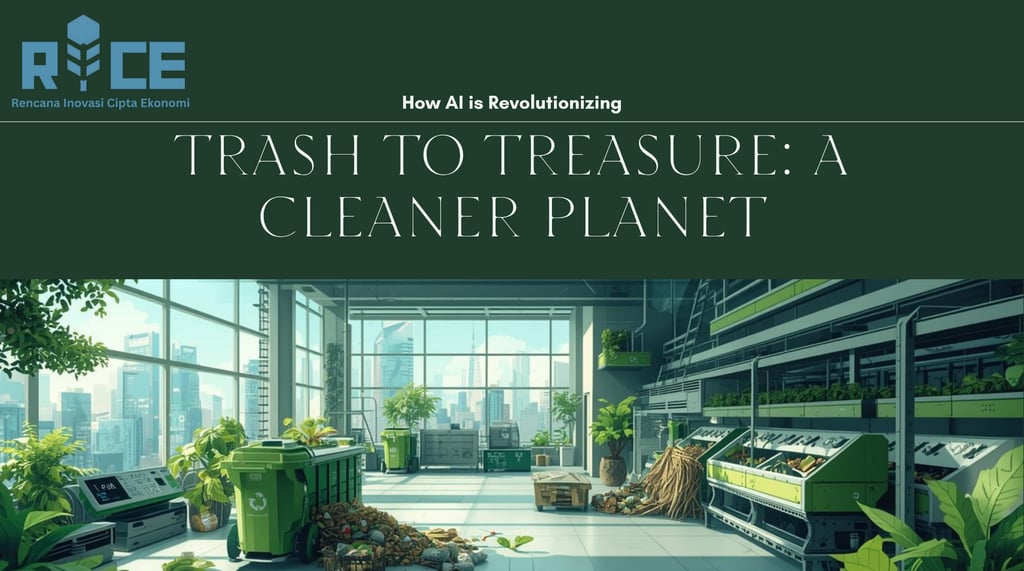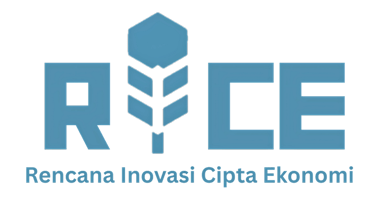Trash to Treasure? How AI is Revolutionizing Waste Management for a Cleaner Planet
Explore how AI transforms waste management. Smart solutions optimize collection, sorting, and recovery for a cleaner planet and a true circular economy.
AI INSIGHT
Rice AI (Ratna)
10/2/20256 min read


The escalating global waste crisis presents one of humanity's most formidable environmental and economic challenges. With urban populations burgeoning and consumption patterns accelerating, the sheer volume of waste generated annually is pushing traditional management systems to their breaking point. Landfills overflow, oceans become plastic graveyards, and valuable resources are squandered, demanding a radical shift in how we perceive and process discarded materials.
Enter Artificial Intelligence (AI), a transformative technology poised to redefine waste management from a burdensome necessity into an intelligent, resource-efficient ecosystem. AI is not merely optimizing existing processes; it is fundamentally altering the paradigm, enabling us to extract value from waste streams, minimize environmental impact, and foster a truly circular economy. This deep dive explores how AI's predictive capabilities, sophisticated analytics, and automation are paving the way for a cleaner, more sustainable planet, turning what was once considered trash into a quantifiable treasure.
The Global Waste Challenge: A Looming Crisis
Our planet is drowning in waste. Every year, humanity generates over 2 billion tons of municipal solid waste, a figure projected to surge by 70% to 3.4 billion tons by 2050 if current trends persist. This overwhelming volume places immense pressure on infrastructure, ecosystems, and human health. The consequences are dire and multifaceted, ranging from pervasive land and water pollution to significant greenhouse gas emissions from decomposing organic matter in landfills.
Traditional waste management approaches, largely reliant on manual labor and static collection schedules, are proving increasingly inadequate. They are inefficient, costly, and often reactive, failing to address the underlying issues of waste generation and resource recovery effectively. The economic burden is substantial, with countries spending billions annually on waste collection and disposal, much of which could be mitigated through smarter, more proactive systems. The imperative for innovative, technologically advanced solutions is not just an environmental aspiration; it is an economic necessity.
AI's Foundational Role in Smart Waste Management
Artificial Intelligence offers a powerful suite of tools to address the complexities of modern waste management. By leveraging data-driven insights and automated decision-making, AI transforms every stage of the waste lifecycle into a more efficient, cost-effective, and environmentally friendly process. It moves beyond simple automation to introduce intelligence, learning from vast datasets to predict trends, optimize operations, and enhance resource recovery. This intelligence is crucial for transitioning towards truly "smart cities" where waste management is seamlessly integrated with urban infrastructure.
AI's strength lies in its ability to analyze massive volumes of real-time and historical data, identifying patterns that human analysis might miss. This allows for predictive modeling of waste generation, helping municipalities and waste companies anticipate needs and allocate resources more effectively. For instance, AI can correlate waste volumes with population density, seasonal events, and economic indicators, providing granular insights. Platforms like those developed by Rice AI specialize in deploying advanced AI models that can ingest diverse data streams—from sensor data to demographic information—to build comprehensive predictive frameworks, enabling a proactive rather than reactive approach to urban resource management. (Internal Link Suggestion: Link to Rice AI's "Smart City Solutions" page)
Intelligent Collection and Logistics
One of the most immediate and impactful applications of AI in waste management is the optimization of collection logistics. Traditional waste collection often follows fixed, inefficient routes, leading to unnecessary fuel consumption, increased operational costs, and higher carbon emissions. AI-powered systems can revolutionize this.
Through advanced algorithms, AI can analyze real-time data from various sources, including GPS trackers on collection vehicles, traffic patterns, and smart bins equipped with fill-level sensors. This allows for dynamic route optimization, where collection routes are adjusted in real-time based on actual need. Vehicles are dispatched only when bins are nearing capacity, significantly reducing mileage, fuel consumption, and vehicle wear and tear. Furthermore, predictive maintenance models, leveraging AI, can forecast potential equipment failures in collection fleets, enabling proactive repairs and minimizing costly downtime. This intelligent approach makes collection more efficient and reduces the carbon footprint associated with waste transport.
Enhanced Sorting and Recycling
The effectiveness of recycling hinges on the accuracy and efficiency of sorting. Contamination remains a significant challenge, often leading to valuable materials being diverted to landfills. AI is fundamentally transforming sorting facilities, turning them into highly efficient resource recovery centers.
AI-powered robotics, integrated with advanced computer vision systems, can now identify and segregate different types of materials at incredibly high speeds and with unparalleled accuracy. These robotic arms can distinguish between various plastics, metals, paper grades, and even organic materials, often surpassing human capabilities in both speed and consistency. By reducing contamination rates, AI enhances the quality of recycled materials, making them more attractive to manufacturers and strengthening the circular economy. This technological leap means more material is recovered, less goes to landfill, and the entire recycling process becomes more economically viable. (External Link Suggestion: Link to an article or website about AI-powered recycling robots, e.g., "ZenRobotics" or "Recycleye")
Waste-to-Energy and Resource Recovery Optimization
Beyond sorting, AI plays a crucial role in optimizing waste-to-energy processes and the recovery of valuable resources from mixed waste streams. For facilities converting waste into energy—be it through incineration, anaerobic digestion, or gasification—AI can fine-tune operational parameters to maximize energy output and minimize emissions. This involves analyzing the composition of incoming waste, adjusting combustion conditions, and predicting maintenance needs for complex machinery.
Moreover, AI is advancing the concept of "urban mining," where valuable components like rare earth metals or specific polymers are meticulously extracted from electronic waste or industrial byproducts. AI algorithms can identify subtle indicators of valuable materials within complex matrices, guiding automated systems for precise extraction. This systematic approach to resource recovery is a cornerstone of the circular economy, ensuring that finite resources are kept in use for as long as possible. Rice AI's sophisticated AI models can analyze industrial process data, optimizing energy flows and material recovery rates, making these complex operations more sustainable and profitable.
Overcoming Challenges and Looking Ahead
While the potential of AI in waste management is immense, its widespread adoption is not without challenges. Significant initial investments are required for AI infrastructure, including sensors, robotics, and advanced data processing systems. There are also critical considerations around data privacy and security, as these systems collect vast amounts of information. Furthermore, the transition to AI-driven systems necessitates a skilled workforce capable of deploying, maintaining, and evolving these sophisticated technologies, highlighting a need for new training and education programs. Ethical considerations also arise regarding job displacement and ensuring equitable access to these technological advancements.
Despite these hurdles, the trajectory for AI in waste management is one of rapid innovation and expansion. We can anticipate even more autonomous systems, where waste collection and processing are largely self-managed, driven by real-time data and AI. Advancements in material science combined with AI will enable the identification and recovery of an even broader range of valuable materials. Hyper-localized waste solutions, perhaps involving decentralized micro-recycling facilities powered by AI, could become more common, reducing transportation costs and emissions. The future envisions a waste management system that is not only smart but also inherently regenerative, where waste becomes a foundational input for new products and energy.
The Rice AI Advantage: Driving Sustainable Innovation
At Rice AI, we believe in the power of artificial intelligence to solve the world's most pressing challenges, particularly in the realm of infrastructure and sustainability. Our expertise lies in developing robust, scalable AI solutions that transform complex data into actionable insights, empowering industries to operate more efficiently and sustainably. For the waste management sector, Rice AI offers advanced platforms for predictive analytics, dynamic logistics optimization, and intelligent resource recovery.
We partner with municipalities and waste management companies to design and implement AI systems tailored to their specific needs, from optimizing collection routes to enhancing sorting capabilities and maximizing waste-to-energy conversion. Our commitment is to leverage cutting-edge AI technology to help create a cleaner planet, enabling our clients to reduce operational costs, minimize environmental footprints, and unlock new value from their waste streams. With Rice AI, the future of sustainable waste management is not just a vision; it's a tangible reality.
Conclusion
The journey from a linear "take-make-dispose" economy to a truly circular one is long and complex, but Artificial Intelligence offers a powerful compass. By integrating AI into every facet of waste management, from dynamic collection and precision sorting to optimized resource recovery, we are charting a course toward unprecedented efficiency and environmental stewardship. AI promises not just incremental improvements but a fundamental reimagining of our relationship with waste, transforming it from a liability into a valuable resource.
The benefits are clear: reduced environmental pollution, significant cost savings, enhanced resource security, and a substantial step towards mitigating climate change. For industry professionals, municipalities, and policy makers, embracing AI in waste management is no longer an option but a strategic imperative. The time to invest in intelligent solutions is now, to harness AI's potential to create a cleaner, healthier, and more sustainable world for generations to come. Explore how AI can transform your waste management strategy and contribute to a greener future.
#AIforGood #WasteManagement #CircularEconomy #SmartCities #Sustainability #EnvironmentalTech #RecyclingInnovation #AITechnology #CleanPlanet #ResourceRecovery #FutureOfWaste #GreenTech #ArtificialIntelligence #EcoFriendly #RiceAI
RICE AI Consultant
To be the most trusted partner in digital transformation and AI innovation, helping organizations grow sustainably and create a better future.
Connect with us
Email: consultant@riceai.net
+62 822-2154-2090 (Marketing)
© 2025. All rights reserved.


+62 851-1748-1134 (Office)
IG: @riceai.consultant
